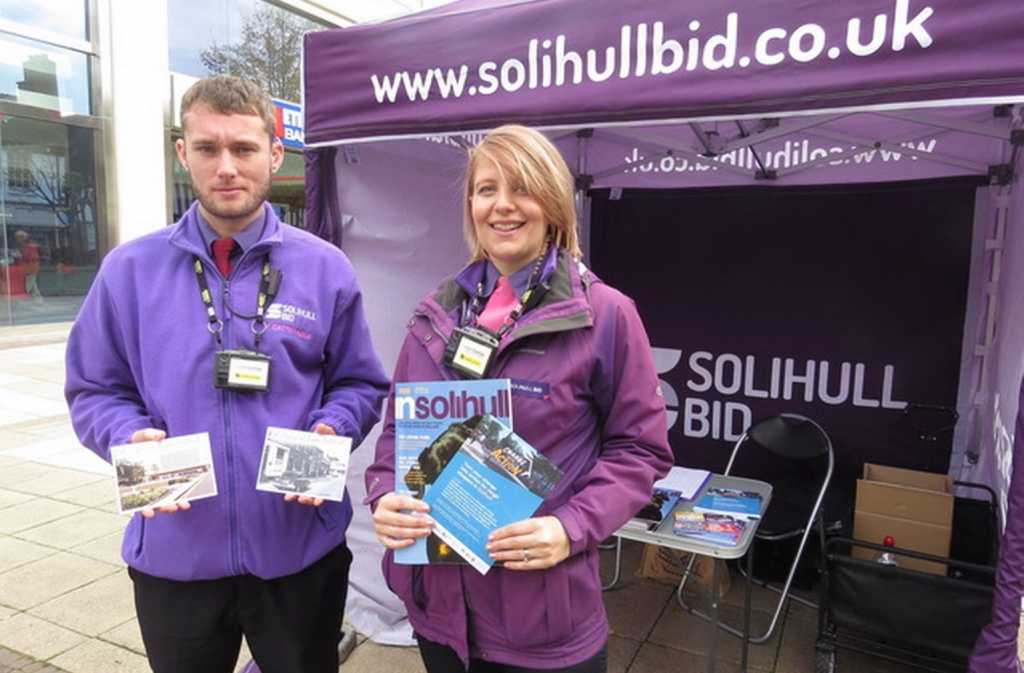The future of Solihull town centre in spotlight as businesses vote on BID renewal

It is almost a decade since the arrival of Solihull Business Improvement District (BID) and we should know in a week or so whether town centre traders have given the nod to extend the scheme until 2025.
Ahead of the result, the Local Democracy Reporting Service (LDRS) looks at how BIDs work in practice, some of the recent activity in Solihull and what the key priorities would be for the next five years.
Since Britain’s first BID was set-up in Kingston, in London, around 300 other towns and cities have launched similar schemes – with Solihull joining the group back in 2010.
The idea originated in North America and given that the set-up is still comparatively new in the UK, many members of the public probably have questions about who exactly is involved.
Melanie Palmer, Solihull BID’s chief executive, offers a brief overview.
“They are business-funded,” she told the LDRS. “All businesses – we have around 450 live businesses in Solihull – pay into the pot.
“This funds the BID every year and the businesses are directing projects.”
Each BID covers a clearly defined zone, with lines on a map to mark out its boundaries. A ballot of the businesses must take place before a scheme can be set up and at five year intervals thereafter to renew the project for each new term.
Locally the BID has co-ordinated events such as the annual Food and Drink Festival, held last month, and pre-Christmas markets.
It also organises the “Excellence Awards” each year, publishes the quarterly InSolihull magazine – promoting the town centre – and has launched a BID card, which offers discounts to workers in the zone.
Tony Elvin, general manager of the Touchwood shopping centre, said that the BID scheme encouraged “collaboration and team working” between traders.
Solihull BID gives local businesses the chance to take an active role in making our town centre the best it can be.
“As a community, we can harness the drive, energy and commitment of everyone in Solihull to continue bucking national retail trends and create something very special.”
Work is also carried out to address some of the challenges facing the town centre and concerns raised by business.
In Solihull one issue which has come to increasing prominence in the past 18 months or so is the rise in begging, with fears the activity was putting off some shoppers from visiting.
In its latest business plan, the BID said it has been supporting the Change into Action scheme, recently launched to help support genuine rough sleepers.
“This activity is slowing incidences of begging and we are committed to further partnership work to increase this reduction,” the document added.
The plan also included comments from members, with Julie Gilronan, from Everyman Barbers, saying that BID events helped “drive up footfall” and Jade Linton, from Thursfields Solicitors, arguing the project provided an “invaluable link” with customers.
The public face of the BID are the town hosts, who can often be seen out on the street in their distinctive purple jackets.
Two of their four team members were out on the High Street last week, speaking to passers-by. The stand will tend to be in place between 12noon and 3pm every Thursday.
Town host Emma Turnbull, from Shirley, said the team could help with anything “from first aid to directions”.
“I think we have become a familiar sight to people,” she said. “You get that really positive feedback and people like having that friendly face if they have something they need sorting out.”
Emma joined the BID eight years ago after switching from a job in admin, while her colleague Frank Cattermole is the newest recruit, having started in April.
Formerly a member of security staff, Frank, from Acocks Green, said this role tended to mean speaking to people in more pleasant circumstances rather than during “a drama or when it had kicked off”.
While BIDs remain separate from local government, politicians have voiced their support for the project.
Andy Street, the Mayor of the West Midlands, this week said that the BID had done “a phenomenal job”.
“Solihull BID has been an outstanding success and it has helped to bring a huge number of activities to the town.
Looking forward I think the BID should carry on doing what it does best, focusing on events and activities that help bring people into the town, as well as keeping up with the basics such as street cleanliness.”
Cllr Ian Courts, leader of Solihull Council, also gave his backing at the most recent cabinet meeting, where councillors agreed to support another term – with offices in Manor Square, the local authority obviously has a say.
“Let’s hope [the ballot] is successful – we need it to be,” said Cllr Courts. “It would be devastating if that didn’t go ahead.”
During a different item at the same meeting there had been some discussion about the failure last year to set-up another BID in neighbouring Shirley town centre.
While a simple majority of firms had given their backing to the proposals, crucially there was not sufficient support from the larger outfits – who make the biggest contributions – for the scheme to proceed.
Shirley councillors were quick to voice disappointment when the plans unravelled, having hoped for a major investment in services, although Solihull Ratepayers Association had sounded a degree of scepticism during the run-up to the result.
Speaking last year, secretary Trevor Eames said: “It’s a choice for the businesses at the end of the day, but if I was a small trader operating on the Stratford Road I wouldn’t want to pay another tax.”
One criticism of BIDs is that the annual contributions for those eligible businesses within the zone – which range from £130 to £1,560 in Solihull – are compulsory, even if they themselves voted “no”.
Ms Palmer said that the nature of the secret ballot meant that the BID wasn’t privy to how individual outlets had voted, but that extensive work, including surveys and regular visits, was done to ensure that members got “a return on their investment.”
A poll in November last year found a 90 per cent satisfaction rating among companies.
The BID ballot does of course come at a crucial time for high streets, which are facing increased competition from online retailers.
Earlier this year, Solihull Chamber of Commerce had published a detailed “snapshot” of the borough’s economy.
The 16-page report said that Solihull outperforms on “skills, earnings and growth” but lingering inequality and an ageing population posed challenges.
Setting out the vision for the next five years, Ms Palmer said that the proposals would include holding more regular events and ensure visitors felt “safe”.
“In future people will want to spend more leisure time in town centres,” she said.
This echoes the council’s own proposals for the future of Solihull’s shopping parades, with Cllr Courts having talked about the importance of offering “an experience” to visitors.
The BID ballot closes on 31 October, with the result expected to be announced soon afterwards.
Read more: https://www.birminghammail.co.uk/news/midlands-news/future-solihull-town-centre-spotlight-17158689

